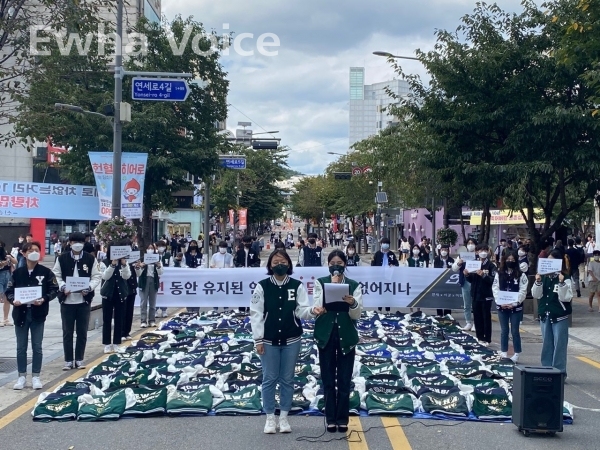
On Sept. 20, Seodaemun-gu announced a plan to abolish Transit Mall, which has been designated on Yonsei- ro, since 2014. Transit Mall, better known as “Car-Free Street” to residents, restricts traffic except for ambulances, bikes, and public transportation. Public transportation was also blocked from 2 p.m. Friday throughout the weekend.
Seodaemun-gu has expressed plans to strike down the Transit Mall since June when the new mayor appointed. The district contends that the revocation would enable market revitalization near Yonsei-ro and ease traffic congestion. It revealed that 1,948 local merchants had submitted a petition to Seodaemun-gu to allow vehicular traffic.
However, students from schools located in Seodaemun-gu are concerned about the decision. The student council emergency committees of each school immediately conducted a survey on the proposed abolishment. In the case of Ewha, out of 707 respondents, 73.4 percent preferred to maintain the current policy. The majority of surveyed students from Sogang University and Yonsei University showed their disapproval as well, marking 89 and 82.6 percent, respectively. With the students’ strong opposition, the three schools set up a joint action named “Yonsei Street Union” and held a press conference on Sept. 3 at Yonsei-ro.
Seodaemun-gu is receiving formal objections regarding the abolishment until Oct. 11 and will begin implementation from Oct. 9. The Traffic Administration Division of Seodaemun-gu asserted that they are trying to listen to as many opinions as they can regarding the abolishment. It conducted a public forum for all stakeholders including students, on Aug. 22 to hear opinions from all.
Meanwhile, the emergency committees from Ewha and Yonsei have criticized Seodaemun-gu over the lack of communication with students who are major users. Ryu Taegyeong, the president of Ewha Emergency Committee, never had a chance to directly deliver Ewha students’ opinion to Seodaemun-gu since Ewha Emergency Committee was not officially invited to discussions hosted by the district government, including one that held on Sept. 22. Ryu pointed out that Seodaemun-gu is rushing into the abolishment without fully interpreting how it will manage the aftermath ofresuming vehicle traffic through Yonsei- ro.
“The students and Seodaemun- gu might have reached a consensus if Seodaemun-gu had been willing to resolve students’ concerns,” Ryu said. “The safety of pedestrians is not assured as the Yonsei-ro does not have any instruments to separate the sidewalk and car street. Shrinking places for college students to perform can be improved if the district government provides alternative locations. I do not see any attempts by the district government to resolve these problems.”
Choi Min-hyuk, the executive chairman from the Emergency Committee of Yonsei University, presented a written opinion in the name of the Yonsei University Student Council to suggest hosting a forum on Aug. 3. In an interview with the mayor on Sept. 7, Choi requested deferring the abolishment and establishing a multilateral consultative group to discuss the issue for at least three months.
“All of our requests have been rejected,” Choi said. “Seodaemun- gu was firm in the decision as the abolishment was one of the mayor’s election pledges. The district government found it pointless to discuss for another three months since they believe it would change nothing.”
Civic groups are also focusing on the revocation, as it marks a step backward in both pedestrian rights and climate change measures in urban policy. The Urban Action Network (UAN) is one of the leading groups that held a press conference on Sept. 15 to urge the Seoul city government to prevent the revocation.
Maeng Kidon, the Secretary General of UAN, emphasizes that the revocation would weaken the foundation of policies ensuring pedestrian rights of way that Seoul has promoted since 1997 when an ordinance on pedestrian’s rights of way was enacted.
“Yonsei-ro was the first Transit Mall in Seoul,” Maeng said. “Throughout eight years of implementation, Yonsei- ro has fostered pedestrian-centeredcultures. I question whether a mayor has the authority to destroy the legacy that the citizens have established.”
With regard to climate change, Maeng stressed that Seoul is in urgent need to reduce the number of vehicles. He believes the city should seek to extend and enlarge Transit Mall location, instead of eliminating.
“Seodaemun-gu could have extended the Transit Mall around Yonsei-ro and identified it as a pedestrian-friendly district,” Maeng said.
Maeng is skeptical about the possibility of Seodaemun-gu either reversing or postponing its decision. Nevertheless, he will endeavor to preserve the pedestrian-friendly culture of Yonsei-ro through various means, including submitting a formal objection and organizing protest with college students.

